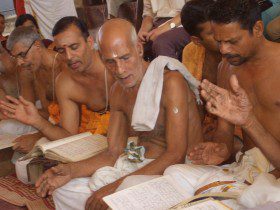The following blog post was written by Michael Witzel, Wales Professor of Sanskrit, Harvard University, about the International Vedic Workshop, the most prominent get-together of Indologists involved in the study of the Vedas the world over, which took place in January 2014.
Following up on the SAI-sponsored attendance of 3 Sanskrit Harvard graduate students and Prof. WItzel at the 12-day 2011 Agnicayana ritual in Kerala, the 6th Intl. Vedic Workshop in Kozhikode (Kerala) was organized in January 2014. SAI again sponsored one graduate, Finnian Gerety, to travel and attend the conference.
 The 6th International Vedic Workshop was held at Kozhikode (Calicut), in Kerala, India, from January 7-10, 2014. Exactly 117 persons had registered and 57 scholarly papers were delivered during these days of proceedings, see http://www.ivw2014.org/images/IVW-Program-Format.pdf. Speakers came from India, Europe, Japan and America, with about equal numbers for each of these four areas. One of the two Harvard graduate students who participated was sponsored by Harvard’s South Asia Institute, for which we are grateful.
The 6th International Vedic Workshop was held at Kozhikode (Calicut), in Kerala, India, from January 7-10, 2014. Exactly 117 persons had registered and 57 scholarly papers were delivered during these days of proceedings, see http://www.ivw2014.org/images/IVW-Program-Format.pdf. Speakers came from India, Europe, Japan and America, with about equal numbers for each of these four areas. One of the two Harvard graduate students who participated was sponsored by Harvard’s South Asia Institute, for which we are grateful.
As I have experienced myself, and as I have also heard from many participants, all of us were extremely pleased by the smooth organization of the conference and of the cultural performances connected with it. The meetings were held in a cooperative and extremely friendly atmosphere that did not allow any extraneous intrusions of matters that were not linked to the four Vedas. As a result, the Workshop was held in the same scholarly manner as at any of the previous locations over the years (Harvard University 1989, Kyoto University 1999, Leiden University 2002, University of Texas Austin 2007, Centre for Eurasiatic and Afroasiatic Studies, Bucharest 2011).
Read more >>
